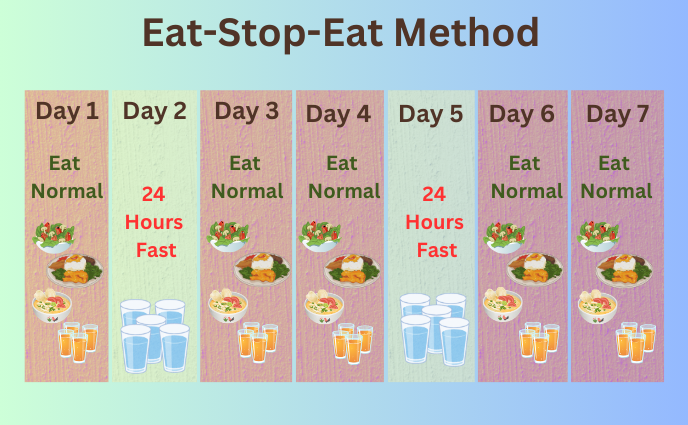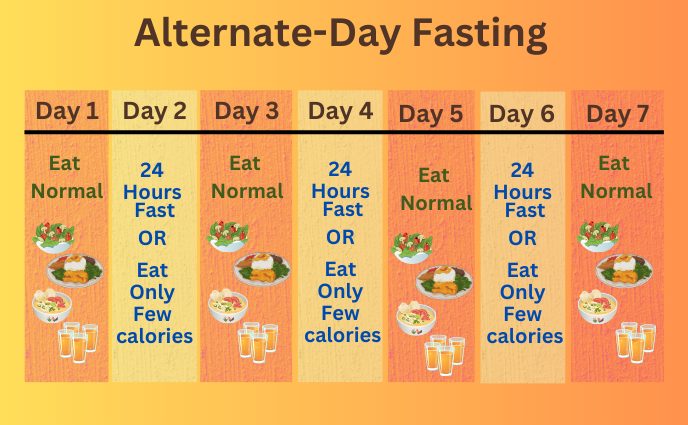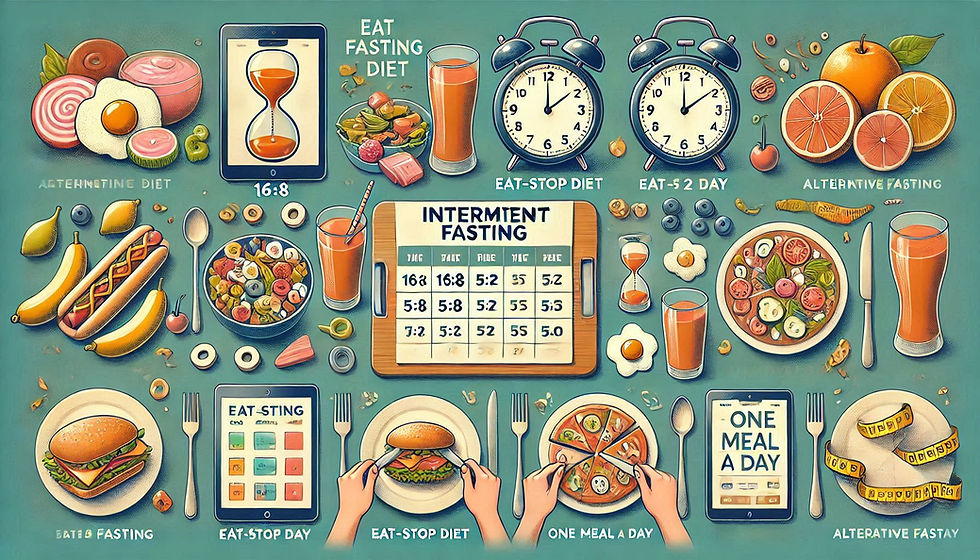Why Intermittent Fasting Isn’t Just a Weight-Loss Trend
- Urvashi Kaushal
- Dec 12, 2024
- 15 min read
Brain, Body, and Beyond

"Let’s face it—most of us have, at some point, wanted to magically shed a few pounds overnight. From juice cleanses to no-carb-intake, crash diets to high-end meal plans, we've seen it all. Over the years, the world has gone through a lot of weight-loss fads. Each of them had its own great promise: guaranteed loss in no time and the creation of a slimmer waistline. If you have tried any of them, you'll know that they can be so frustrating. Some leave you hangry; others sap your energy; and most just aren't sustainable.
Recently, intermittent fasting is making buzz in the wellness world. It’s especially popular in fitness and bodybuilding spaces when people are “cutting” to lose a large amount of body fat in a short amount of time. Some even claim it improves athletic performance, says Destini Moody, a renowned Athlete’s Dietician with Top Nutrition Coaching, who’s well-regarded for her expertise in holistic nutrition and mental health.
Over time, intermittent fasting has gained popularity, as it promises some pretty exciting benefits: weight management, better energy levels, improved focus, and even potential boosts to your overall health. It’s like a little reset button for your body—and who doesn’t need that in today’s fast-paced world?
But here’s the thing: Not all fasting advice floating around the internet is legit. One of the reasons intermittent fasting has become so popular is because, like other fad diets, there are a set of “rules” to follow. The idea of being told exactly what to do and when to do it in order to lose weight is way more appealing than advice like “eat in moderation” which is much more ambiguous and intimidating to most, explains Destini.
Let’s explore what intermittent fasting is really about, bust some common myths, and share tips to help you decide if it’s the right fit for you. Spoiler alert: It’s not just another trend—it’s a tool for a healthier, more balanced life.
What is Intermittent Fasting
The intermittent fasting or IF is more like a schedule rather than just a simple diet. It focuses more on when to eat than on what to eat. It gives your body specific eating and fasting windows. During the fasting phase, your body isn’t busy digesting food, which allows it to burn fat and reset.

One alluring part of IF is there’s no one-size-fits-all method. It’s flexible, which is why it’s become a go-to for so many people. Whether you’re a night owl, an early bird, or somewhere in between, there’s likely a fasting method that can fit your vibe.
Popular Intermittent Fasting Methods
The 16:8 Method (a.k.a. Leangains Protocol)

The Leangains Protocol involves fasting for 16 hours straight and eating all your meals within an 8-hour window. Many people find it easy to skip breakfast and consume all their meals between 12 PM and 8 PM. It’s seen as a sustainable option, especially for those new to fasting, as you’re only skipping one meal instead of multiple. I personally followed this regime, and the result is magical!(see the pictures below.)
“This is the most common protocol and, in my opinion, the most doable. I have even been known to implement this method during certain periods of my fitness journey. It’s pretty handy if you’re someone who eats very large portions at meal times as shortening your 'feeding window' can help you control your daily calorie intake.” shares Destini.

The 5:2 Diet

If fasting every day sounds overwhelming, the 5:2 diet offers a more flexible approach. It allows you to eat normally for five days of the week while restricting your calorie intake (to 500–600 calories) on the remaining two days. These two fasting days are usually non-consecutive to make the process more manageable. Unlike stricter fasting methods, the 5:2 diet doesn't require you to go without food completely, making it a more approachable option for those who want to dip their toes into fasting. However, Destini is not a fan of this approach.
“I’m not sure how effective this is as it hardly seems like fasting at all, but it could be more sustainable for people who just can’t go hours and hours with zero food,” says Destini.
Eat-Stop-Eat Method

For those seeking a more intense fasting experience, the Eat-Stop-Eat method might be appealing. This method requires fasting for a full 24 hours, typically once or twice a week. Unlike the 16:8 method, which allows you to eat daily, this approach involves going an entire day without food.
For example, if you finish dinner at 7 PM on a Monday, you wouldn’t eat again until 7 PM on Tuesday. This method is effective for those looking to reduce calorie intake on a weekly basis, but it demands mental and physical discipline.
Alternate-Day Fasting

Alternate-day fasting is one of the more challenging approaches. As the name suggests, it involves fasting every other day. On fasting days, you can either avoid food entirely or consume a very minimal amount of calories. This cycle repeats continuously — for example, you eat as usual on Monday, fast on Tuesday, and resume normal eating on Wednesday. While it offers rapid results, the extreme nature of alternate-day fasting makes it difficult to maintain over the long term. This approach is typically reserved for experienced fasters or those under medical supervision.
“Both the Eat-Stop-Eat and Alternate-Day fasting methods are not methods I would recommend if you’ve never fasted before. It’s also difficult for me to recommend in general because going without food for an entire day seems a bit extreme and can come with nasty side effects (i.e. stomach pain, fatigue, brain fog, irritability) that can make it unsustainable,” explains Destini.
How Does Intermittent Fasting Work?
“Studies have shown that traditional dieting and intermittent fasting deliver similar results in terms of weight loss,” explains Destini. While many people believe that intermittent fasting is a revolutionary approach to fat loss, the science behind it is relatively simple. The process revolves around manipulating the body's natural hormonal responses to eating and fasting. When you eat, insulin levels spike to help process glucose (sugar) for energy or storage. But during fasting, insulin levels drop significantly since there’s no food to process. “No food = low insulin = more fat burning,” Destini points out. This drop in insulin signals the body to start tapping into stored fat for energy, essentially activating the body's natural "fat-burning mode." For those seeking an effective weight-loss strategy without feeling like they’re constantly "dieting," intermittent fasting offers a natural, sustainable alternative.
Beyond fat burning, fasting has another remarkable benefit: autophagy. “Fasting triggers a process called autophagy,” Destini shares, highlighting one of the lesser-known perks of fasting. Autophagy is like a deep-cleaning mode for your body, where old and damaged cell components are broken down and replaced with new, healthier versions. This process plays a critical role in cellular health, reducing inflammation, and promoting overall well-being. It’s essentially your body's way of "taking out the trash" at a cellular level. By enhancing autophagy, fasting is believed to have anti-aging effects, which is why it has gained popularity in wellness communities.
On top of fat loss and cellular rejuvenation, intermittent fasting also provides a metabolic boost. During fasting periods, your body releases higher levels of norepinephrine, a hormone known for its fat-burning properties. This hormonal surge can give your metabolism a temporary boost, allowing you to burn more calories even when you're not engaging in physical activity. Over time, this metabolic shift may also improve your body’s sensitivity to insulin. “While fasting can encourage fat loss, it’s important to note that your body can also burn through muscle if it’s deprived of food for too long,” Destini cautions. This is especially true for extreme fasting protocols like 24-hour fasting windows, where the body may resort to breaking down muscle tissue as a survival mechanism. For athletes and weightlifters, this could be a cause for concern, as maintaining muscle mass is crucial for performance and strength.
In summary, intermittent fasting works by lowering insulin levels to promote fat burning, triggering autophagy to clean up cellular debris, and providing a metabolic boost to keep your body burning calories more efficiently. While the benefits are promising, extreme fasting methods should be approached with caution. “Nobody wants to lose muscle mass over time, and that’s exactly what can happen with more extreme fasting protocols,” Destini warns. For those considering fasting as a lifestyle change, it's wise to start with gentler methods like the 16:8 protocol before moving on to more challenging approaches.
How Does Intermittent Fasting Benefit Your Brain?

This is the most curious part for many of us —what’s in it for me? Well, it’s not just about fitting in your old jeans (though that’s a nice perk). Intermittent fasting (IF) goes deeper, offering health gains that make it worth considering as a lifestyle choice.
1. Weight Management That Actually Works
When it comes to weight loss, IF doesn’t force you to obsessively count calories or cut out your favorite foods. Instead, it focuses on when you eat, not just what you eat. By limiting your eating window, you naturally reduce calorie intake without even trying. Plus, fasting switches your body to fat-burning mode, making it easier to shed those extra pounds. Destini explains, there are plenty of studies that show that IF and traditional dieting are equally effective at weight loss when structured properly, but some studies show that weight loss from fat is more profound with traditional dieting than fasting when weight loss comes from both fat and muscle.
2. Improved Metabolic Health
Intermittent fasting doesn’t just burn fat; it helps optimize the entire system. Regular fasting helps in improved metabolic health which reduces your risk of chronic conditions like diabetes, heart disease, and even certain cancers. “Fasting has been linked to reductions in chronic inflammation, which is one of the key drivers of many chronic diseases,” explains Destini. However, she cautions that fasting isn’t a free pass to eat whatever you want during your eating window. “If your feeding window is packed with high-sugar, high-sodium, and low-fiber foods, you’re still at risk of developing these conditions,” she warns.
3. Brain Boosts and Reduced Inflammation
Among the most exciting areas of research on intermittent fasting is its potential effect on the brain. Some studies show that intermittent fasting promotes the production of brain-derived neurotrophic factor (BDNF), a protein correlated with better cognitive function, memory, and mood. BDNF manufactures existing neuron protection while promoting the formation of new neurons. There have been some animal studies that have shown this effect in the brain, but we need more science with humans to extrapolate this recommendation to the masses, says Destini. This emerging area of science has intrigued researchers looking at potential therapies for neurodegenerative diseases like Alzheimer’s and Parkinson’s.
Fasting also triggers autophagy, a process where damaged cells are cleared out and replaced with fresh, healthy cells. This cellular "spring cleaning" is believed to reduce inflammation, which has a profound effect on brain health. “Any type of calorie restriction can induce autophagy, but fasting is especially effective at kick-starting this process,” Destini notes. She further add, studies have also shown that any sort of calorie restriction helps induce autophagy, with exercise causing even more of an increase in autophagy.
Can Intermittent Fasting Improve Memory, Focus, or Stress Management?

Here is where things become somewhat tricky. Fasting can actually have the opposite effects in the short run. “When the brain is deprived of glucose, you may experience poorer mental performance at first,” explains Destini. The preferred fuel source for the brain is glucose. But anecdotal evidence suggests that after a few weeks of fasting, people report more intense focus and clearer mental clarity. More research is needed to substantiate this, but the theory is that as the brain acclimatizes to fasting, it learns to rely on ketones (produced when fat is broken down) for fuel rather than glucose.
And stress management is also in their purview. While fasting might initiate a moderate stress response in the body (cortisol may rise), several people find themselves feeling more resilient because of fasting. It could be mental discipline required in order to fast effectively. Over time, the practice may be an enabler of building mental resilience, whereby the fasting individuals feel more in control of their eating habits and stress response.
Is Intermittent Fasting Safe? Separating Myths from Reality
1. Myth: Fasting Slows Down Your Metabolism
One of the biggest fears people have about fasting is that it will send their metabolism into hibernation. However, Intermittent fasting actually gives your metabolism a boost—at least in the short term. Studies have shown that, in the short term, your metabolism floods itself with adrenaline when it goes into survival mode as a result of fasting and this gives your metabolism a slight boost, at least in the first few days of fasting, explains Destini.
2. Myth: Will I lose muscle if I fast?
People associate weight loss with muscle loss, assuming the body will start breaking down muscle for energy. No, your body prioritizes burning fat first that stores over muscle. Plus, many IF enthusiasts pair fasting with strength training, which helps preserve and even build muscle.
3. Myth: Fasting Is Just Another Diet Fad
This is a common misconception about intermittent fasting as many lumps it with short-lived diet-craze. But fasting isn’t new—it’s rooted in ancient practices and has been studied extensively in modern science. Intermittent fasting isn’t about restricting specific foods; it’s a sustainable lifestyle approach that has been practiced for centuries in cultures worldwide—from Ramadan to Yom Kippur. It’s backed by research and offers flexibility, making it accessible to many.
4. Myth: Fasting Isn’t Safe for Women
Another myth about intermittent fasting is that women shouldn’t fast because it can mess with hormones. While it’s true that women may need to approach fasting differently, that doesn’t mean it’s unsafe. While it is true that women, such as those struggling with an eating disorder, may lose their menstrual cycle as a result of undernutrition, this is more extreme than intermittent fasting. As long as you are doing IF correctly, women shouldn’t be afraid to try it, says Destini. One should avoid extreme fasting protocols, especially if they experience signs of hormonal imbalance. Instead of forcing the body into strict fasting routines, women can find success with a more flexible and personalized fasting plan.
Intermittent Fasting Tips for Beginners: Gradual Steps and Mindfulness Hacks
If you are new to fasting, IF may sound a little intimidating to you. But slowly, the habit can lead to a sustainable style of life. Instead of starting immediately with fasting for a harsh 16 hours and eating in an 8-hour slot, the beginner should try starting out softly. “Starting with the 5:2 Diet may be the least intimidating for beginners,” recommends Destini. “Unlike continuous fasting for hours, the 5:2 approach allows for five regular eating days and two low-calorie days, making it easier to stick with.” This method offers mental flexibility and allows your body to adjust slowly, reducing the "shock" factor of fasting.
Practical Tips for Intermittent Fasting Beginners
If you’re new to intermittent fasting (IF), don’t worry—it’s not as intimidating as it sounds. Here are some friendly, practical tips to ease you into the fasting lifestyle without feeling overwhelmed.
1. Start Small, Think Big
Another beginner-friendly method is the 12:12 approach, (12 hours fasting, 12 hours eating), and then increase the fasting period as your body adjusts. So, if you usually eat late-night snacks, try setting a “kitchen curfew” and stop eating after 8 p.m.
2. Hydration Is Key

Fluids are important not only because they rejuvenate your skin but it also helps reduce hunger pangs and keep your energy levels constant. Keep yourself hydrated with water, herbal teas, or black coffee. You may add a few lemon drops to your water for a refreshing twist—it’s fasting-friendly and makes plain water less boring!
3. Focus on Nutrient-Dense Meals
Always choose foods that are high in nutrients and keep you full longer. Think lean proteins, healthy fats, whole grains, and lots of veggies. Avoid breaking your fast with sugar or processed foods, as they can spike your blood sugar and leave you feeling sluggish.
4. Plan Your Fasting Schedule Around Your Life
Pick a fasting method that fits your lifestyle. If you’re not a morning person, skip breakfast and do a 16:8 fast from noon to 8 p.m. The best schedule is one you can stick to consistently. If you know you have a family dinner planned, adjust your eating window so you can still enjoy meals with loved ones. “make sure you’re eating plenty of protein during your feeding window,” Destini adds. "Not only will this help preserve muscle mass, but it can create a feeling of satiety that will make maintaining the fast easier."
5. Listen to Your Body
IF is a tool not a punishment, it is about finding the right balance and feeling good. It isn’t one-size-fits-all, and it’s okay to adjust based on how you feel. If you’re lightheaded or overly hungry, don’t force it—break your fast with a healthy snack and try again tomorrow.
6. Keep a Journal or App

Tracking your fasting hours, meals, and how you feel can help you stay on track and notice patterns.
7. Be Patient with Yourself
Like any lifestyle change, intermittent fasting takes time to show results. Don’t stress if you slip up—focus on consistency over perfection.
Who Should Skip Intermittent Fasting & What are The Potential Risks and Concerns
Intermittent fasting (IF) can be a powerful tool for improving health, but it’s not for everyone. While many people find success with fasting, certain groups should be cautious or avoid it altogether.
1. Pregnant or Breastfeeding Women

Pregnancy and breastfeeding are stages where nutrition takes center stage. Your body requires an abundance of nutrients and calories to support both you and your baby. This is why intermittent fasting is generally not recommended during this period. “Both mommy and baby need all of the nutrients they can get, and weight loss during pregnancy is counterintuitive to what the body needs during this critical time,” explains Destini. Restricting food intake during this crucial phase could lead to complications like fatigue, nutrient deficiencies, and developmental issues for the baby. Prioritizing balanced, nutrient-dense meals is essential for the health and well-being of both mother and child.
2. People with Eating Disorders or a History of Disordered Eating
Intermittent fasting can encourage restrictive eating habits, which may trigger or worsen disordered eating behaviors. For individuals with a history of anorexia, bulimia, or binge eating disorder, fasting could interfere with recovery or exacerbate unhealthy relationships with food. “Dietitians do not recommend any form of fasting to those with a history of eating disorders as these eating patterns can mimic the harmful eating patterns they used to adhere to,” Destini explains. This can be triggering and may even cause a relapse. Instead, a more balanced approach to eating that encourages mindful consumption of food is often a better path to recovery and sustained well-being.
3. Individuals with Diabetes or Blood Sugar Issues

Intermittent fasting has been linked to improved insulin sensitivity, but it’s not a one-size-fits-all solution for those with diabetes or blood sugar issues. “There is some evidence that IF can help improve insulin sensitivity,” says Destini. However, for people with Type 1 or Type 2 diabetes, fasting can pose unique challenges. It may cause dangerous fluctuations in blood sugar, especially for those on medication. “Due to the crucial need to control blood sugar with these conditions, you should only subscribe to IF under the supervision of a healthcare professional,” Destini advises. If you’re considering IF as a diabetes management tool, close monitoring and guidance from a healthcare provider are essential for safety and effectiveness.
4. People with Certain Medical Conditions (Heart Disease, Liver Disease, etc.)
If you have heart disease, liver disease, or other chronic conditions, intermittent fasting may not be suitable. Fasting can put additional strain on your organs, and people with preexisting conditions should take extra precautions. Before considering intermittent fasting, it’s crucial to consult with your doctor to ensure it won’t interfere with your treatment plan or overall health.
5. Those with a Low Body Mass Index (BMI)
If you have a low BMI or are underweight, intermittent fasting could lead to further weight loss or nutrient deficiencies. Your body needs adequate calories and nutrients to maintain healthy functioning, and fasting might make it harder to meet those needs.
How To Tackle Common Challenges in Intermittent Fasting
Intermittent fasting (IF) might sound easy—skip a meal here, fast a little there—but stopping hunger pangs or managing energy dips in intermittent fasting, is the real struggle. Let’s learn now how to deal with cravings and tips to stay motivated while fasting.
1. Hunger Pangs: The #1 Complaint

One of the most common struggles with intermittent fasting is dealing with hunger pangs. These are less about true hunger and more about your body adjusting to a new eating routine. “It’s like your stomach is throwing a tantrum because it’s used to constant snacking.” To manage hunger, “Eat plenty of protein to stay satiated and stay hydrated with water,” Destini advises. Protein keeps you full longer, while water suppresses hunger without affecting insulin levels.
2. Energy Dips
Fasting can lead to energy dips, especially if blood sugar levels drop. “When food digests too quickly, it’s like driving a car with bad gas mileage,” says Destini. This can cause afternoon slumps. “Make sure you’re getting enough sleep and hydration,” Destini suggests. Eating high-fiber carbs and lean proteins will ensure steady energy levels by preventing blood sugar crashes.
3. Social Situations: FOMO Feels Real

Birthdays, brunches, or late night social events don’t exactly scream fast-friendly. Adjust your eating window to match the event. Or if you are unable to do so, skipping one fast won’t derail your progress. Enjoy the event and pick back up tomorrow.
4. Cravings for Junk Food
Fasting sometimes makes us overcompensate during eating windows, reaching for chips or donuts to “reward” ourselves. Keep nutritious snacks handy so you’re not tempted. Moreover, cravings often fade within minutes. Take a walk or try a hobby instead of diving into the snack drawer.
5. Lack of Motivation
All good things take time, even Rome is not built in one day. The lack of instant gratification can make sticking to IF feel like a chore. Keep a journal of how you feel, changes in energy, or inches lost. Progress isn’t just about the scale.
Intermittent fasting can bring positive changes in your overall health and well-being. Whether it's about improved weight management and metabolic health, sharper focus, or reduced inflammation.
Although it’s still not a magic tool that fits all people. One must carefully consider how their personal needs, goals, and lifestyle fit into it before starting. Despite the benefits of fasting, it is equally important to meet the challenges of hunger pangs, the social environment, and dips in energy with well-informed strategies and guidance from someone knowledgeable.




コメント